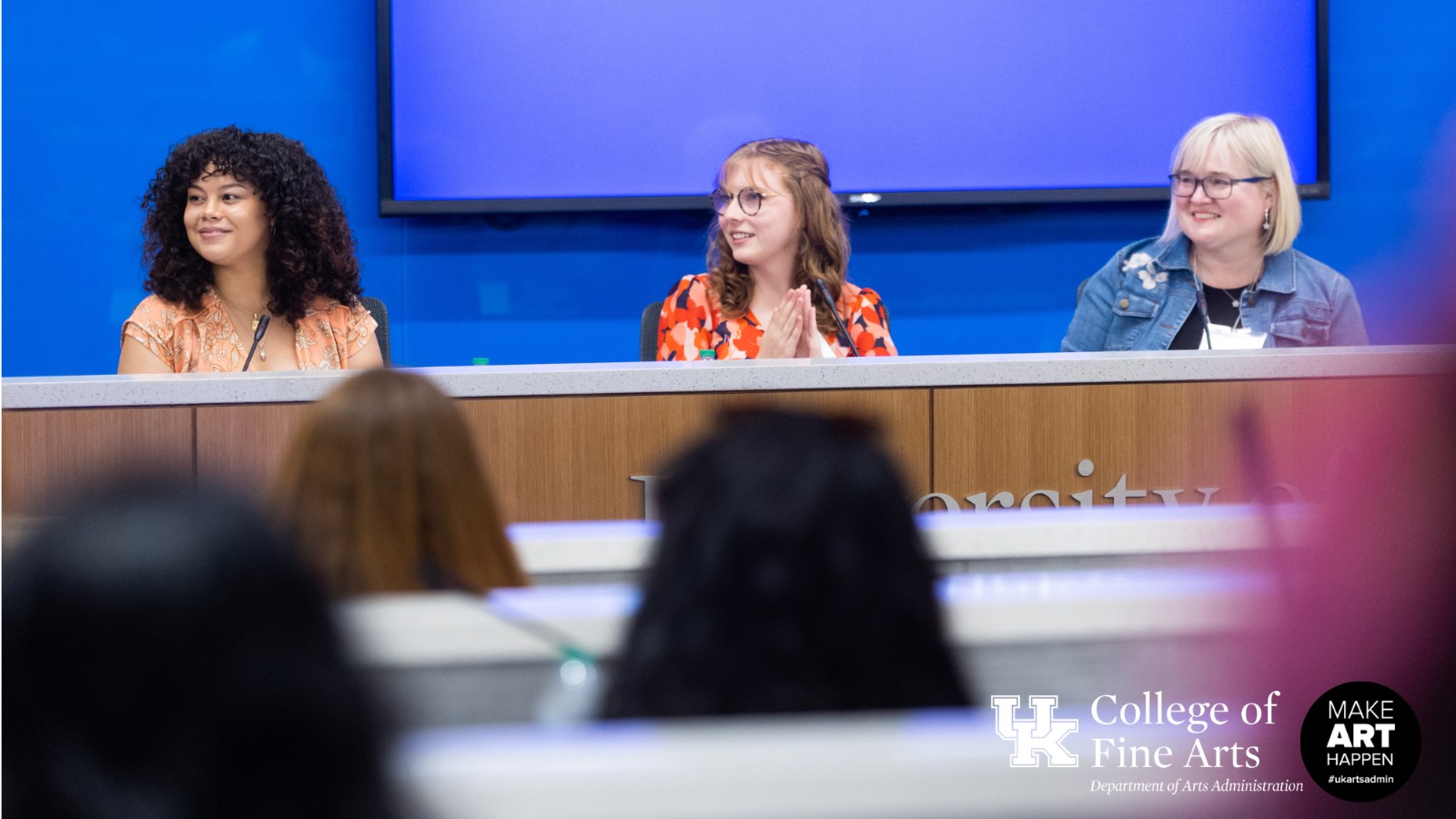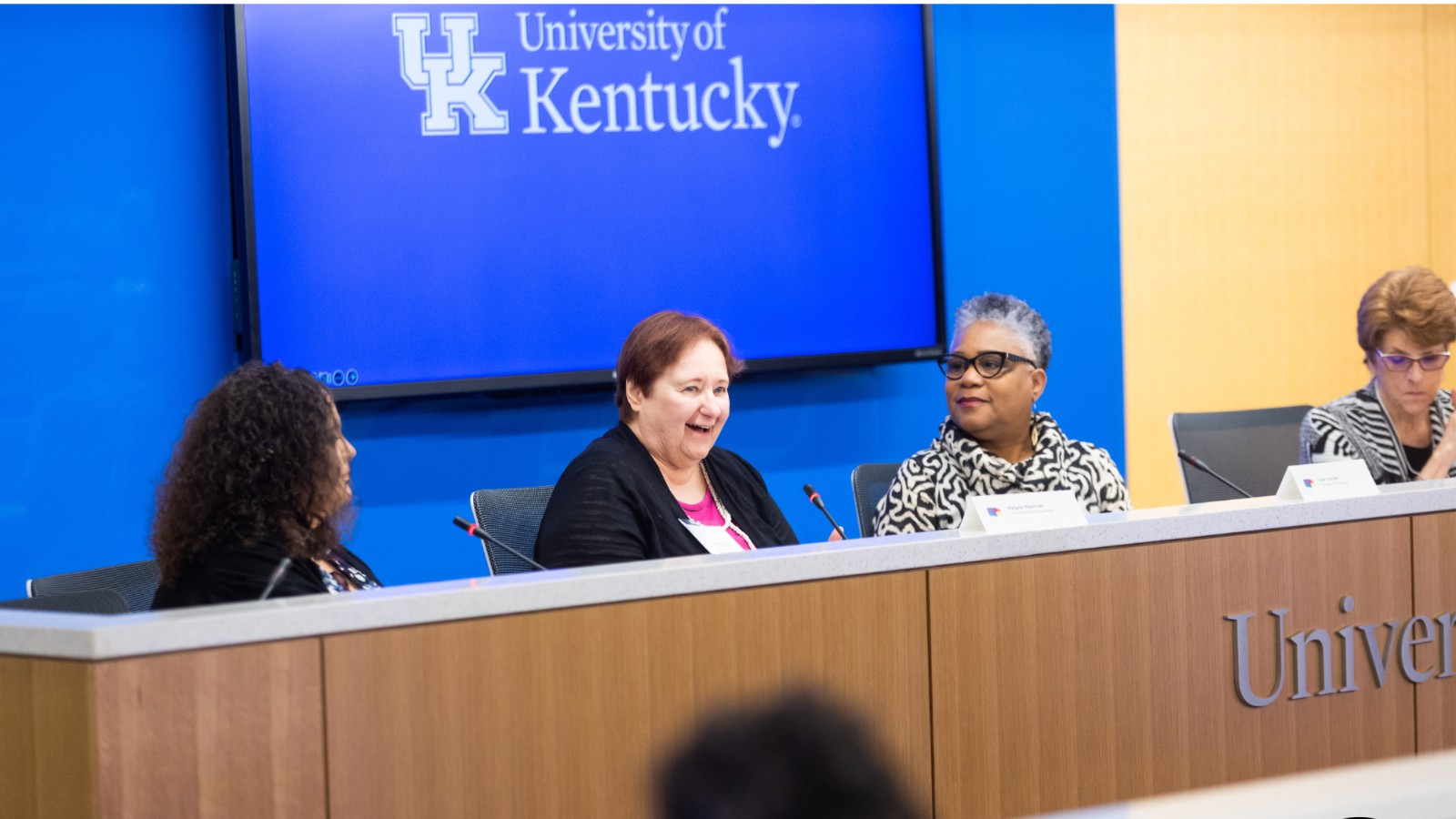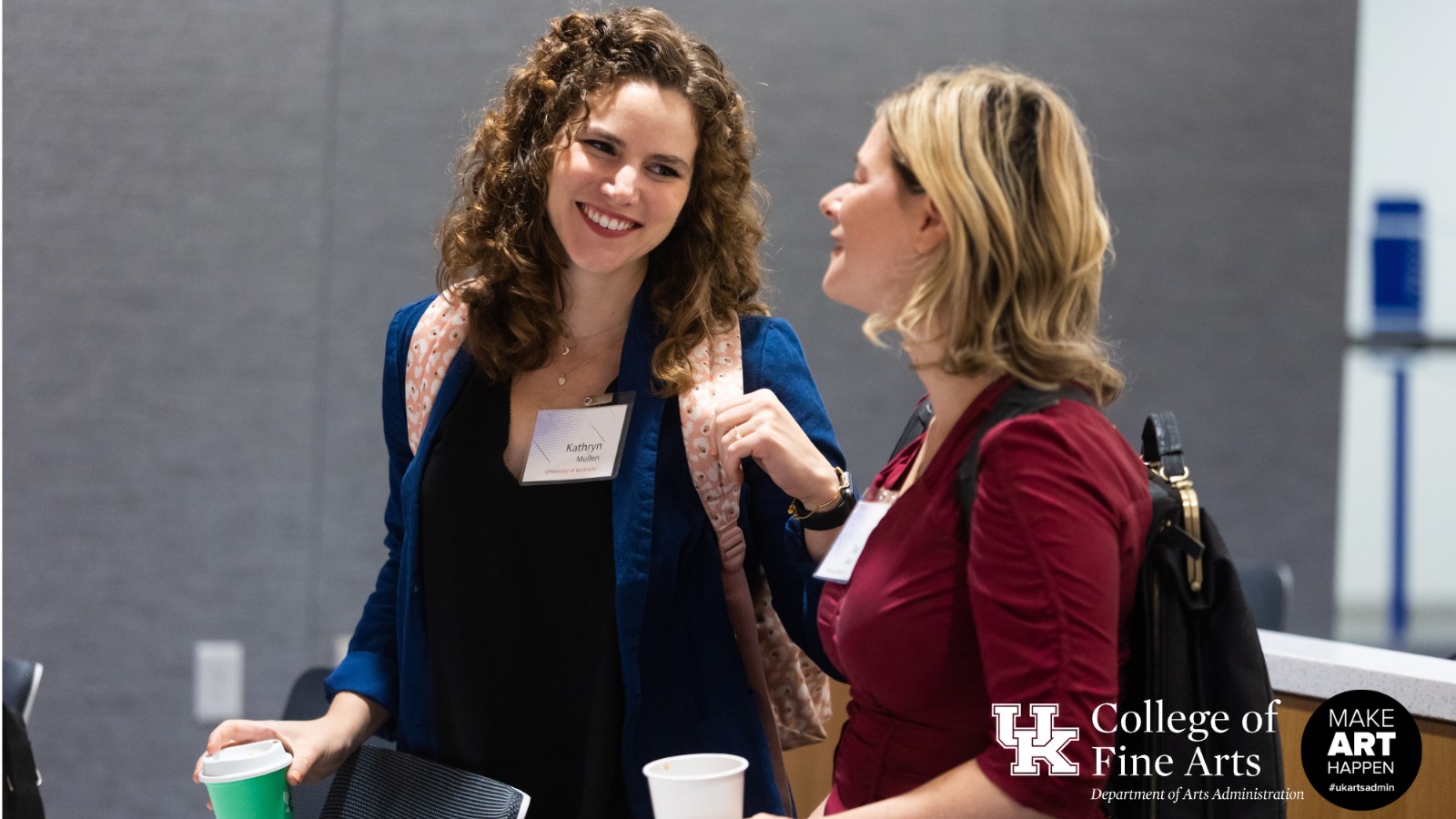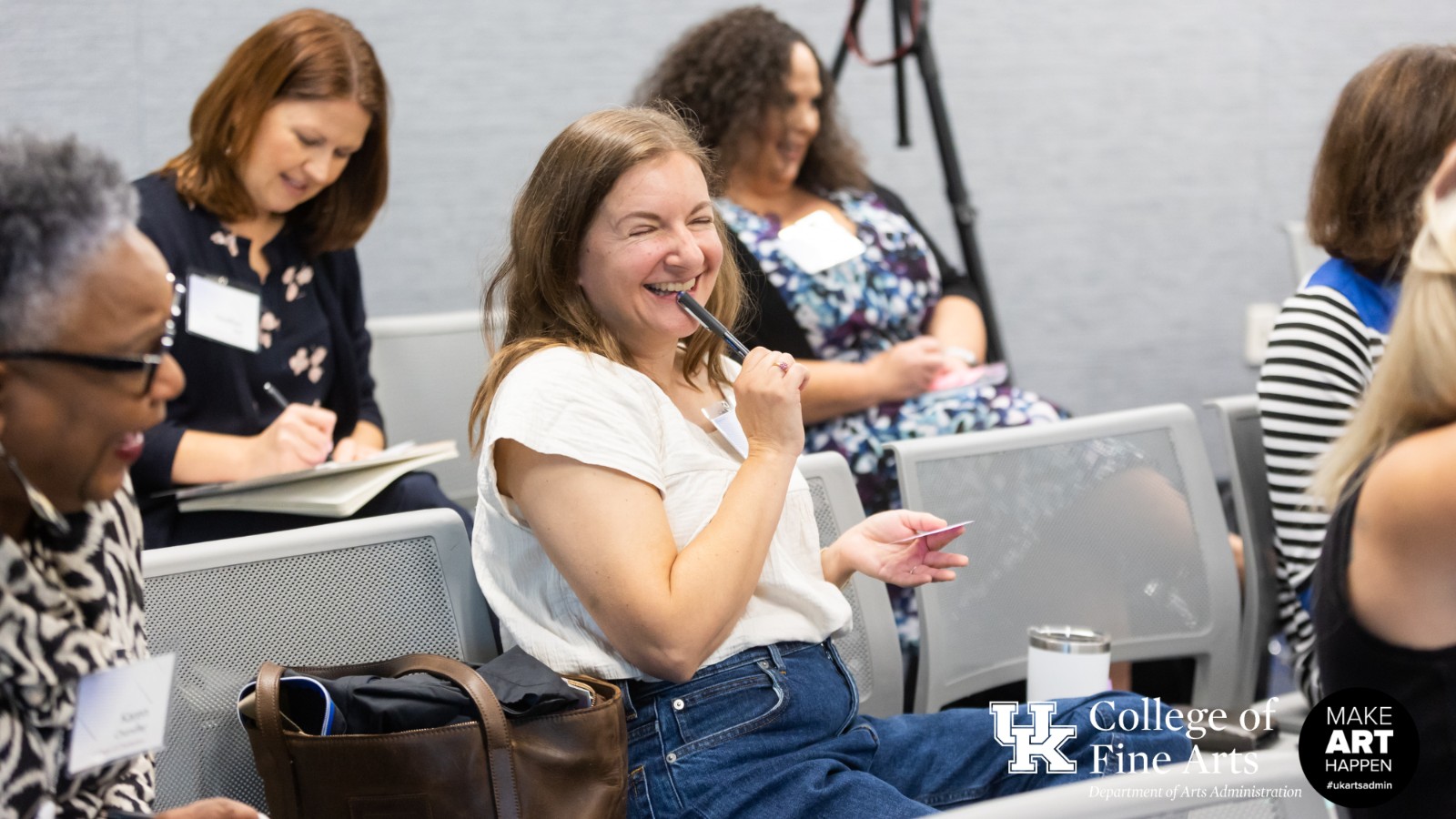2023-12-11
Report “The Women’s Perspectives in Arts Administration Symposium”
A Day of Inclusive Excellence

Women make up a large proportion of those involved in both practical cultural management and research into cultural institutions. Nevertheless, their specific perspectives and needs often remain in the background. Therefore, empowering women is the aim of the symposium "Women’s Perspectives in Arts Administration Symposium”, whose inaugural edition took place in September 2023, focusing on women-identifying scholars.
Contributors to this report include Destyni Green, MA in Arts Administration Alumnae; Rose Ginther and Dr. Leslie Vermeer, Associate Deans at the Faculty of Fine Arts and Communications at MacEwan University, Canada; Kathryn Mullen, Lecturer in Arts Administration; and Joshua Prentice, MA Student in Arts Administration at the University of Kentucky.
On September 20, 2023, the Department of Arts Administration at the University of Kentucky (UKy) held the inaugural Women’s Perspectives in Arts Administration symposium, themed: The Past, Present, and Future of Scholarship. The purpose was to celebrate the contributions of women scholars in the interdisciplinary and transdisciplinary field of arts administration by bringing together an intergenerational group of women-identifying scholars, from undergraduate students to emeritus professors, into a one-day symposium themed around the past, present, and future of women’s perspectives in arts administration scholarship.
Embracing the ‘unconference’ method of participant-driven engagement, the symposium activities involved intergenerational panel discussions, student-led breakout sessions, and interactive plenaries on topics ranging from the historical development of the field and gendered dynamics in arts management, to women’s arts entrepreneurship and collaborative and innovative frameworks. Ultimately, by making space for women’s intergenerational and transdisciplinary knowledge exchange, we strived to increase visibility of a diverse range of voices representing our the historical, contemporary, and future field development of arts administration. Our overarching aim was to increase the awareness of women’s contributions in the establishment, development, growth, and innovation of arts administration scholarship. The following reflections bring together the unique experiences of organizers, presenters, and attendees, and highlight their voices on the impact of the symposium from their distinct perspectives.
Connection/Intention by Destyni Green
Going into this year, I would have never imagined partaking in the planning and implementing one of the most genuine grounds for interaction I've ever experienced. The Women's Perspectives in Art Administration inaugural symposium was a beautiful demonstration of the freeing sensation one can achieve through connection and belonging.
Initially, I got involved in the symposium leading up to the last semester of my MA program. I knew I had to fulfill an independent study, and I wanted to use that time not only to learn and expand my practice as an administrator but also to reach others in an impactful way. My academic advisor then, Dr. Jaleesa Wells, sent me her ideas surrounding WPAA, and I immediately was engaged to create my independent study project about this symposium. Off the bat, the symposium was a bright, warm entity that energized me and woke up my senses. I participated in the planning of the symposium and saw it materialize. With each proposal, it became more and more evident just how rich the perspectives of women are for the future and how vital these perspectives have been for implementing and sustaining the field in the past and in the present.
The day of the symposium came; I greeted presenters, mounted cameras, engaged in short yet memorable interactions, and moderated a few presentations. During the presentations, I was struck by how much the attendees had to say to one another and the speakers in reflecting on the topic. This was my favorite part of the symposium: seeing how the ideas and research of our presenters created space for the group to engage deeply with one another. To me, it was the first time I witnessed such a space. Dynamics of power, sexism, racism, or class did not limit the experience or silence any voices. Coming from different ecosystems and interactional identities allowed us to learn from one another's perspectives in a way that felt free and human. It was intentional and real.
Like many of the symposium participants, I left that day feeling moved by the way we were able to connect and wanting more of this type of interaction. Overall, it was an incredibly inspiring event that has made me even more aware of the need to join this community of women administrators in scholarship. I look forward to future possibilities to have these exchanges again.
A Resurrection of Women’s Histories and Lived Experiences by Rose Ginther and Dr. Leslie Vermeer
We left plenary session on the Historical Development of Arts Administration Scholarship feeling awed, inspired, and overwhelmed. In this session, the speakers discussed the need to document the lived experiences of women in arts administration who laid the foundations for today’s practitioners.
We were awed by the speakers’ own resurrection of history and their expressions of gratitude for the women who had gone before them, and by the speakers’ courage to acknowledge pain alongside gratitude as they called out structural barriers — gendered, racialized, economic — that interfered with progress in their own careers — barriers that in too many cases still persist.
We were inspired to take this evocation of history back to our city as a potential book project on the history of Edmonton-area women in arts administration whose dedication and leadership have helped make Edmonton, Canada a thriving centre for performing arts, literary arts, museums and galleries, and living history sites. We were overwhelmed, at least initially, by the scale of such an undertaking. As we listened to the plenary speakers, we were reminded of how vital women have been to the history of cultural sites and cultural presentation in the Edmonton area and the way their stories have been, and remain, unheard and unsung. The women (and men) who performed early arts management were pioneers: they professionalized themselves in an age with few or no role models.
As we talked about uncovering the stories of these women, we realized how important it is also to surface untold stories about other historically underrepresented groups that have contributed importantly to Edmonton’s history, such as Edmonton’s early Chinese immigrants, the early Black settlers, the LGBTQ+ communities that lived in the shadows through most of the twentieth century, and of course the Indigenous Peoples whose cultures and practices were often ignored and sometimes actively imperiled by colonialism. If we publish a book about pioneering arts administration and arts administrators, we must acknowledge the history of silencing, exclusion, and erasure that often underpinned Edmonton’s arts and cultural communities. This means reining in our own privilege and making space for these voices — and making space for storytelling that might not be laudatory, celebratory, or even positive.
The opportunity to listen to women talk about the labour of other women — to meet with empathy, in solidarity with others — was immensely affirming, joyous, and moving. From this affirmation, we hope to document and remember the women who came before us, before these memories are lost. We have an opportunity to record history differently, and the plenary session illustrated a way to seize it.
Identifying Prevalent Issues Facing Women Through the Unconference Experience by Kathryn Mullen
At WPAA, Professor Heather McDonald and I served as a facilitator for an unconference session. We gathered for one hour in a room with around a dozen women-identifying participants to discuss topics chosen by attendees of the larger Women’s Symposium. The first randomly selected prompt was, "How do intersectional identities (race, gender, ethnicity, etc.) influence women’s experiences and contributions in arts administration?” The following discussion was impassioned and empathy-building. Everyone in the room spoke at least once, many sharing personal details about how their identities and professional experiences overlap, compete, and often create an expanse of challenges at every stage of arts administration and adjacent careers.
Several themes emerged in the course of an hour, including the following three:
- Women are socialized and expected to "carry the load” as caretakers. Next to personal expectations, this also comes into play in workspaces (consider committee service), in the classroom, and in community engagement practices.
- Women of color and those with certain experiences or identities (such as Jewish or Hispanic) are frequently pigeonholed into specific roles. Breaking free of stereotypes can be particularly challenging when navigating spaces that do not account for intersectionality.
- In order to make systematic changes, we must think about how we can join forces and engage allies. Working in spaces historically designed by white men, for the success of white men, is often an uphill battle, but we are each one of many in a similar journey.
In the hour session, I went from sitting in a room full of women I knew almost nothing about, to engaging in a safe space where I felt both empathy and trust. I was reminded why we gather for conferences, why we must be open, and how our unification has the potential to strengthen our field. As we strive toward an understanding of and balance between our priorities and our purposes, we must continue to develop and invest in communities like the ones created through the WPAA Symposium. The principle of emergence was evident in our unconference session: we are more powerful than the sum of our parts. I believe that only together we can make lasting change.
A Question of Allyship by Joshua Prentice
After Professor Tara Baker completed her presentation, "One of the "Emery Girls"” (meaning one of the girls of the Emery Theatre in Cincinnati), which took place during the session titled Women’s Arts Entrepreneurship Frameworks, I asked her how male allies of women in leadership positions can convince other men - who are not supportive of those women - to become allies themselves? In the abstract for the presentation, Professor Baker writes, "My perspectives on sexism are rooted in a specific example, being termed an "Emery Girl,” despite managing a multi-million-dollar project founded by two (adult) women.” One can now see where my question came from, and I continued to think about it as time went on. Days before the conference, I had approached one of the professors of the Arts Administration Master’s program at the University of Kentucky about a possible independent study, and by the time the conference had finished, I knew what I wanted my topic to be.
During the morning plenary on "Historical Development of Arts Administration Scholarship” I was reminded of this fact: most leaders of all my arts experiences have been women; and yet, it seems to me the general consensus of the plenary’s panel was that the state of women in leadership positions in arts administration still hasn’t improved enough. Both can be true, of course - equity of women in leadership positions can have a long way to go while my experiences show how far they’ve already come.
The question I asked Professor Baker was developing in my mind during the morning plenary, but hadn’t yet fully formed. It wasn’t until Professor Rachel Parker’s presentation on "Navigating Resistance to Change in Arts Administration: Integrating the Grief Process for Resilient Leadership” that I realized I needed to seek the answer to the question about allyship myself. The topic for my independent study, "a question of allyship”, has evolved since the symposium as I continue to ask questions I still don’t have an answer to, for example: what role does disability play in the relationship between women leaders and their male-presenting allies? What I do know is that thanks to my participation in the symposium, my interest in the question has a name, and for that, I am forever grateful.
Acknowledgments
This report was compiled by Dr. Jaleesa Wells, WPAA symposium creator and co-organizer, and Assistant Professor of Arts Administration at the University of Kentucky. Images were taken by and provided in-kind by Arden Barnes. The Women’s Perspectives in Arts Administration symposium organizing committee would like to thank the University of Kentucky’s Office of Institutional Diversity for granting us a 2023 Inclusive Excellence Award; and the Department of Arts Administration at the University of Kentucky.
Learn More about the Women’s Perspectives in Arts Administration (WPAA) initiative
Visit the website to learn more about the symposium, and to see the book of presenter abstracts. Join the WPAA Listserv to stay up to date on future opportunities and activities.




There are no comments for this content yet.
similar content

